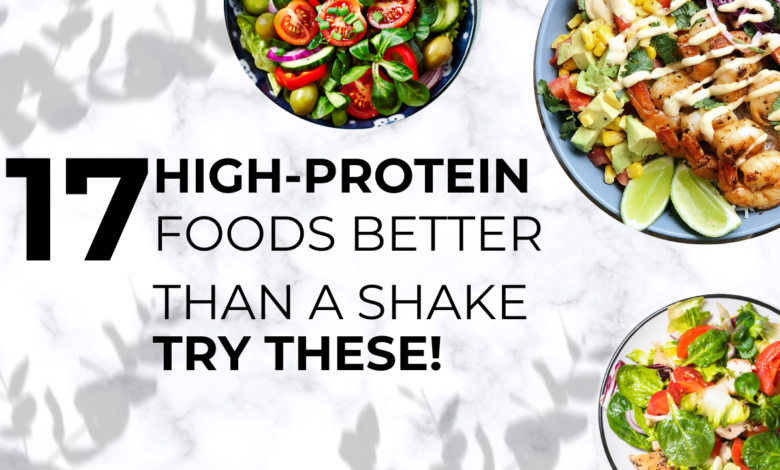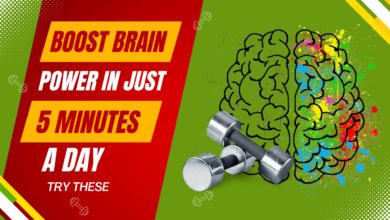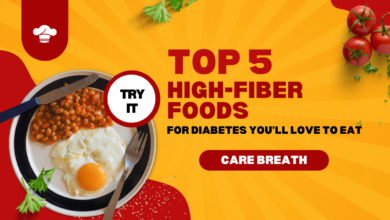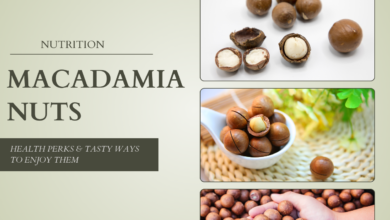17 High-Protein Foods Better Than a Shake – Try These!

Introduction
Protein shakes have become the poster child for gym-goers and fitness freaks alike. But let’s be honest—how many times have you chugged a chalky shake and still felt unsatisfied? You’re not alone. While protein shakes are convenient, whole foods offer way more than just grams on a label. They deliver vitamins, minerals, fibre, and satiety that powders simply can’t match.
So if you’re tired of blending and gulping your gains, this list of 17 high-protein foods that beat a protein shake might just be your new go-to guide.
Why Choose Whole Foods Over Protein Shakes?
Nutritional Completeness
Whole foods come with a full spectrum of nutrients—think fibre, healthy fats, and antioxidants—not just isolated protein.
Digestive Benefits
Real food helps keep your digestive system running smoothly. Shakes can often cause bloating and gas, especially if they’re loaded with artificial sweeteners or dairy-based.
No Additives or Fillers
You know what’s in a boiled egg or grilled chicken breast. Can you say the same about your protein powder’s ingredient list?
Animal-Based Protein Powerhouses
1. Chicken Breast
Clocking in at around 31g of protein per 100g, chicken breast is lean, cheap, and endlessly versatile. Grill it, bake it, dice it—easy protein in every bite.

2. Eggs
One egg delivers about 6g of protein, and it’s a complete protein at that. Plus, you get essential nutrients like choline and vitamin D.
3. Greek Yoghurt
With around 10g of protein per 100g, Greek yoghurt is thick, creamy, and great for breakfast or a snack. Go for the plain version to avoid added sugars.
4. Cottage Cheese
It might be old-school, but cottage cheese is a slow-digesting protein hero thanks to its high casein content. Great before bed to fuel muscle repair overnight.
5. Salmon
Not only does it pack around 25g of protein per 100g, but it’s also rich in heart-healthy omega-3 fatty acids. Brain food meets muscle food.
6. Tuna
Canned tuna is the MVP of convenient protein. About 24g per 100g serving and it doesn’t even need refrigeration. Add it to a salad or sandwich for a quick fix.
7. Turkey Breast
Lean, mean, and full of protein—turkey breast offers about 29g per 100g. It’s also low in fat, making it ideal for cutting phases.
8. Beef (Lean Cuts)
Think sirloin or round steak—beef isn’t just protein-rich (around 26g per 100g), it also delivers iron, B12, and creatine for energy and recovery.
Plant-Based Protein Champions
9. Lentils
With 18g of protein per cooked cup, lentils are a fantastic meat-free option. They’re also high in fibre, which keeps you full and supports gut health.
10. Chickpeas
About 15g of protein per cooked cup, plus they’re cheap and shelf-stable. Make a batch of hummus or toss them into a curry—easy peasy.
11. Quinoa
A rare plant-based source of complete protein. One cup cooked gives you around 8g of protein and loads of fibre. Use it as a rice substitute.

12. Tofu
Tofu soaks up flavour like a sponge and delivers 10g of protein per 100g. Grill it, fry it, or throw it in a stir-fry—it’s as flexible as your workout schedule.
13. Tempeh
Tempeh ups the ante with around 19g of protein per 100g. The fermentation adds gut-friendly probiotics too. A double win.
14. Edamame
Young soybeans pack 17g of protein per cup. Great as a snack or salad topper. Add a sprinkle of sea salt and munch away.
Snacks and Extras That Pack a Punch
15. Peanut Butter
Two tablespoons contain about 8g of protein, plus healthy fats. Spread it on toast or add to smoothies—but go easy, it’s calorie-dense.
16. Protein Bars (Whole-Food Based)
Not all bars are created equal. Look for those made with nuts, seeds, and natural protein sources like egg whites or pea protein.
17. Hard-Boiled Eggs
Perfect on-the-go snack. One egg gives you 6g of high-quality protein and keeps you fuller than a sugary shake.

Tips for Increasing Protein Naturally
- Snack Smart: Swap crisps for roasted chickpeas or a boiled egg.
- Boost Breakfast: Add cottage cheese to your toast or mix Greek yoghurt with fruit.
- Plan Meals: Make sure every meal has a clear protein source—don’t leave it to chance.
- Double Up: Combine plant and animal proteins—chicken and quinoa, eggs and lentils—for a nutrient-packed punch.
Conclusion
Protein shakes might be convenient, but they’re no match for the taste, texture, and nutrition of whole foods. Whether you’re a meat-lover or a plant-based eater, these 17 foods prove that high-protein doesn’t have to mean high-effort or high-cost. So ditch the blender now and then—your muscles (and your taste buds) will thank you.
FAQs
1. What food has more protein than a shake?
Chicken breast, lean beef, lentils, and tempeh all pack more protein per serving than the average shake.
2. Can I build muscle without protein shakes?
Absolutely! Whole foods offer complete protein, essential nutrients, and better overall recovery support.
3. What’s the best high-protein snack?
Hard-boiled eggs, Greek yoghurt, and roasted edamame are all top-notch picks.
4. Are plant proteins as effective as animal proteins?
Yes, especially when combined to form complete proteins. Quinoa, lentils, and tofu are excellent sources.
5. How much protein do I actually need?
It varies, but a good rule is 1.6–2.2g per kg of body weight if you’re training regularly.




